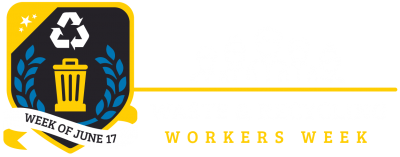Alpine Waste and Recycling has invested in equipment that will allow for Styrofoam recycling and expanded the capacity of its Denver recycling plant, more than doubling its ability to process single-stream recycling material
“Alpine Waste and Recycling has invested in the future of recycling,” says Brent Hildebrand, the company’s vice president of recycling. “In investing in that future, we’ve also invested in trying to save natural resources and pull out as much material from the waste stream as possible.”
But pulling out all recyclable material isn’t always possible, as we explained in our recent cover story, “Breaking Bad.” Glass, in particular, is difficult to recycle — especially when it’s included in the single stream, which is the industry term for when all recyclables are put in the same bin. Between your curb and the recycling center, glass bottles and jars are jostled and dumped several times. They break into small pieces, and those pieces are notoriously difficult to separate from the paper, plastic and aluminum that make up the rest of the single stream.
Denver’s recycling is handled by a private company called Waste Management. Alpine Waste and Recycling is a competitor of Waste Management, though Hildebrand says many of Alpine’s customers are commercial businesses, not municipalities. Hildebrand agrees that recycling glass is challenging, but he says that Alpine has always gone the extra mile: the company trains its employees to pick out the bigger glass pieces by hand (while wearing puncture-resistant, Kevlar-lined gloves) so they can be recycled. The smaller pieces end up in the landfill, he says.
“We have sorters trained to pull the glass out,” Hildebrand says. “On our front end, we’re doing whatever we can do to get as much glass sorted out rather than let it go. We do a pretty good job at it, too.” Hildebrand declined to say how much glass gets recycled and how much goes to the landfill, explaining that those figures are proprietary.
“With the growth of recycling for our company, it justified upgrading the facility,” Hildebrand says. “We took 100 percent of our old equipment out and put brand-new equipment in. It represents the latest technology in the business, and we’re pretty excited about it.”
That technology includes optical sorters that use cameras to detect the type of material on the conveyor belt and then uses air nozzles to push it in the right direction; for instance, paper one way and plastic another. Alpine also has a new “ballistic separator” that separates paper from containers.
One novel piece of new equipment is a device that condenses Styrofoam. Alpine is the first company in Colorado to get it, and Hildebrand is excited. Traditionally, Styrofoam causes problems for recycling companies because it’s so light, Hildebrand says; it doesn’t make financial sense to ship a truck full of Styrofoam to an “end user” — a company that will recycle it into something new — when the price that company will pay for it won’t cover the cost of driving it there.
But the condensing machine makes it easier to ship larger amounts of Styrofoam. “You have to have a certain amount of weight in a truck or train to ship to an end user for it to make sense,” he says.
Alpine hopes to have the machine up and running soon. Once it does, the company will begin accepting Styrofoam from its customers — which Hildebrand says is a first for the area.
The new equipment means that Alpine now has the capacity to take on new customers, as well. “It cements our position on waste diversion,” Hildebrand says of the upgrades. “It shows that we’re willing to continue our investment in making sure we pull as much out of the stream as possible. Many companies are not willing to invest in recycling. Our customers trust that Alpine is a good environmental steward, and we really take that very seriously.”
http://www.westword.com/news/styrofoam-recycling-coming-to-colorado-thanks-to-alpine-waste-7097456
